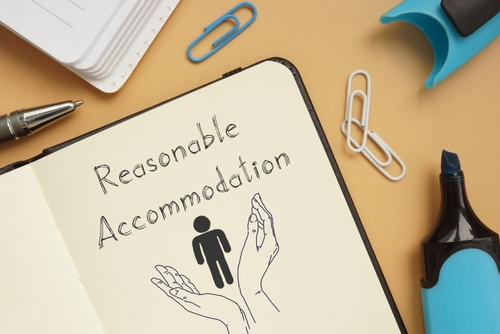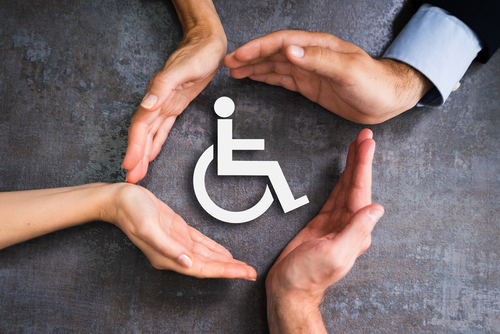Tenants with disabilities deserve the same access to safe and comfortable housing as those without. However, sometimes it takes modifications or special accommodations to ensure they have equal access or comfortability. As a landlord, knowing how to handle these Fair Housing accommodations is crucial. In today’s article, we’ll review the importance of Fair Housing Laws, what qualifies as a disability, and how tenants with disabilities can request reasonable accommodations. Read along to learn more!

Contents of This Article:
- Importance of Fair Housing Laws
- What Qualifies as a Disability?
- What Are Fair Housing Accommodations?
- How to Request Reasonable Accommodations
- Ensure Compliance With Professional Management
Importance of Fair Housing Laws
Fair Housing Laws are crucial in rental housing to ensure equal access and prevent discrimination. They prohibit landlords from unfairly denying housing based on factors like race, religion, disability, and more. Enforcing these laws ensures that all individuals have the opportunity to secure suitable housing.
When it comes to tenants with disabilities, Fair Housing Laws require landlords to make reasonable accommodations and modifications, allowing them to live independently and participate fully in their communities. As such, it’s important for landlords and Northern Virginia property management companies to understand Fair Housing Laws, housing accommodations, and their responsibilities regarding making necessary changes to rentals.
Next, we’ll review what qualifies as a disability and Fair Housing accommodations for tenants with disabilities.
What Qualifies as a Disability?
According to the Americans with Disabilities Act (ADA), a person with a disability is someone who has a physical or mental impairment that substantially limits one or more major life activities. That said, major life activities include things like walking, seeing, hearing, speaking, breathing, learning, working, or caring for oneself.

Some examples of disabilities include the following.
- Mobility Impairments
- Vision Impairments
- Hearing Loss or Deafness
- Neurological Conditions
- Intellectual Disabilities
- Mental Illness
- Chronic Pain Conditions
- And more
What Are Fair Housing Accommodations?
Tenants with disabilities are afforded several legal protections under various federal, state, and local laws. These protections are designed to ensure that individuals with disabilities have equal access to housing opportunities and are not subjected to discrimination.
Fair Housing Accommodations are adjustments or modifications made to a housing unit or common area that enable individuals with disabilities to have equal access to and enjoy their housing on an equal basis with individuals without disabilities. These accommodations are mandated by Fair Housing Laws to ensure that people with disabilities are not unfairly disadvantaged in the housing market.
That said, there are two main types of Fair Housing Accommodations, including the following.
Reasonable Accommodations
Reasonable accommodations are changes, exceptions, or adjustments to a housing provider’s rules, policies, or regulations. These accommodations are necessary to give people with disabilities an equal opportunity to use and enjoy a dwelling.
Examples of reasonable accommodations may include:
- Allowing a tenant with a disability to have an assistance animal, even if there’s a “no pets” policy in place.
- Ensuring that common areas like lounges, gyms, or laundry rooms are accessible to individuals with disabilities.
- Providing a designated parking space closer to the entrance for someone with mobility impairments.
Reasonable Modifications

Reasonable modifications involve physical changes made to a housing unit or common area to accommodate a person with a disability. These modifications are typically at the tenant’s expense, but the housing provider is usually required to permit them.
Examples of reasonable modifications may include:
- Installing grab bars in bathrooms to assist individuals with mobility impairments.
- Lowering countertops in the kitchen to accommodate someone using a wheelchair.
- Expanding doorways or pathways to make them wheelchair accessible or easier for mobility for individuals with disabilities.
How to Request Reasonable Accommodations
Requesting reasonable accommodations is an important step for individuals with disabilities to ensure they have equal access to housing. Here are some of the steps to follow to request fair housing accommodations for a rental home.
- Know Your Rights
- Contact the Landlord or Property Manager
- Clearly State the Request
- Explain How the Accommodation Will Help
- Provide Supporting Documentation
Know Your Rights
First, it’s important to familiarize yourself with the Fair Housing Act, which prohibits discrimination in housing based on race, color, religion, sex, national origin, familial status, and disability. Under the FHA, landlords are required to provide reasonable accommodations for individuals with disabilities.
Contact the Landlord or Property Manager
Reach out to your landlord or property manager to initiate the conversation about requesting a reasonable accommodation. You can do this through a written letter, email, or in person. However, remember that the accommodation you’re seeking should be reasonable and not cause a financial or administrative burden on the landlord.

Clearly State the Request
Be specific and clear about the accommodation you’re requesting. For instance, clearly describe how it relates to your disability and why it’s necessary for you to have equal access to the housing unit. Additionally, keep records of all communication related to your request. This can include emails, letters, or notes from conversations. It’s important to document the process in case you need to refer back to it later.
Explain How the Accommodation Will Help
Provide information on how the requested accommodation will address the barriers posed by your disability. Explain how it will enable you to enjoy the premises in the same way as someone without a disability.
Provide Supporting Documentation
It’s often helpful to provide documentation from a healthcare professional, therapist, or relevant expert that verifies your disability and supports the need for the requested accommodation. This can be a letter, certificate, or any other appropriate form of documentation. If your request is denied, you may want to seek legal advice or contact a fair housing organization for further assistance.
Ensure Compliance With Professional Management
Handling Fair Housing accommodations is an essential part of any landlord or rental property management company. Additionally, knowing how to handle these requests with respect and compliance in mind is a crucial skill for anyone managing rental properties. However, if you’re not well-versed in Fair Housing Laws, you may not fully understand your or your tenant’s rights, which can land you in legal trouble.
Need More Advice? contact us today!
With a professional property management company like Bay Property Management Group, you don’t have to worry about running into legal trouble. Our team of qualified professionals knows how to handle reasonable accommodations and modifications and can help you through the process. We offer full-service rental property management throughout Baltimore, Philadelphia, Northern Virginia, and Washington, DC. Contact BMG today to learn more about how we can help your rental business succeed!
